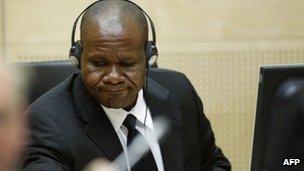DR Congo: Mathieu Ngudjolo Chui acquitted of war crimes by ICC
- Published

The International Criminal Court has ordered that former Congolese militia leader Mathieu Ngudjolo Chui should be freed after he was acquitted of war crimes and crimes against humanity.
The case related to the 2003 killings of 200 residents of Bogoro village in the Ituri region of DR Congo.
The court in The Hague heard reports of victims being burned alive, babies battered and women raped.
Mr Ngudjolo denied ordering the attack, saying he learned of it days later.
He had been charged with seven counts of war crimes and three of crimes against humanity. Prosecutors said he had enlisted child soldiers to carry out the killings. Some of the killings were carried out with machetes.
But presiding Judge Bruno Cotte said the court acquitted Mr Ngudjolo of all charges, saying the prosecution had "not proved beyond reasonable doubt that Mathieu Ngudjolo Chui was responsible" for the crimes committed.
He said the decision was unanimous, and that witness testimony had been "too contradictory and too hazy".
Mr Ngudjolo showed no emotion at the acquittal, according to the Associated Press news agency. His lawyer, Jean-Pierre Kilenda, said his client had always insisted he was innocent.
In its summary, the court stressed that the ruling did not mean it believed no crimes were committed in Bogoro "nor does it question what the people of this community have suffered on that day".
"The chamber also emphasised that the fact of deciding that an accused is not guilty does not necessarily mean that the chamber finds him innocent," the ICC said in a statement.
"Such a decision simply demonstrates that, given the standard of proof, the evidence presented to support his guilt has not allowed the chamber to form a conviction 'beyond reasonable doubt'."
Judge Cotte ordered Mr Ngudjolo's immediate release, and rejected prosecutor Fatou Bensouda's attempts to have him detained pending an appeal.
"The chamber dismisses the prosecution's application for further detention," Judge Cotte said, adding that there were "no exceptional circumstances" to detain Mr Ngudjolo further.
Human Rights Watch said the verdict "leaves the victims of Bogoro and other massacres by his forces without justice for their suffering".
"The ICC prosecutor needs to strengthen its investigations of those responsible for grave crimes in Ituri, including high-ranking officials in Congo, Rwanda and Uganda who supported the armed groups fighting there," said Geraldine Mattioli-Zeltner, the group's international justice advocacy director.
The Coalition for the ICC, a campaign group that monitors the court's work, said the verdict was "a hard blow for the victims and affected communities who had placed all their hopes in the Court to deliver justice, considering the great harm they suffered during the ethnic war in Ituri".
The verdict is only the second in the 10-year history of the ICC, and the first acquittal.
In March, Congolese warlord Thomas Lubanga, Mr Ngudjolo's enemy in Ituri, was found guilty of recruiting and using child soldiers between 2002 and 2003. He was sentenced to 14 years in jail.
The conflict in Ituri was a distinct part of the war that raged in DR Congo following the 1994 genocide in neighbouring Rwanda and involved troops and fighters from several neighbouring countries.
Militia leaders from all sides have been accused of using the conflict to profit from the region's mineral reserves, especially gold.
- Published18 December 2012
- Published5 December 2012
- Published27 November 2012
- Published21 November 2011
- Published17 May 2011